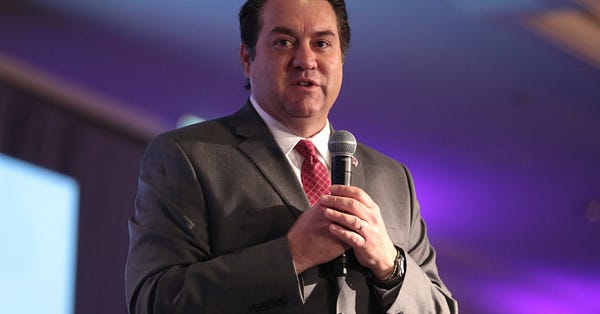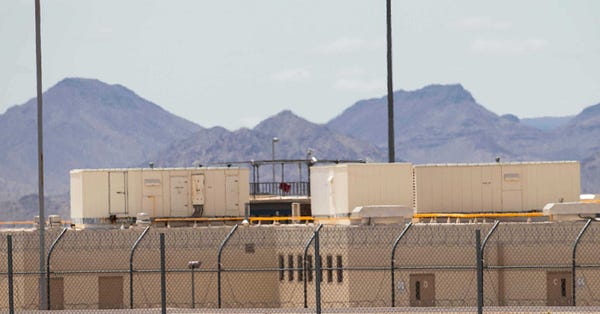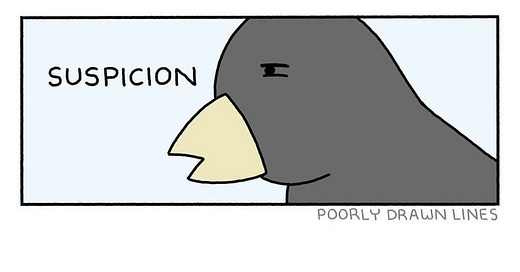The Daily Agenda: Constitutional crisis ahead?
Court orders are easy to follow when you like them ... Ducey misses public life ... And just call it an "institution of book learning."
Gov. Katie Hobbs, who built a national reputation as a defender of democratic institutions during her campaign, may be heading for a constitutional showdown with the Arizona Supreme Court as she attempts to block or ignore the high court’s warrant of execution.
The story of Aaron Gunches’ planned execution is full of weird twists and turns, both from the politicians involved and from Gunches himself. As Arizona reaches a political crossroads with Democrats taking power, Hobbs is among a small number of governors rethinking their states’ death penalty policies. National opinions are shifting against the policy. Along with Democratic Attorney General Kris Mayes, Hobbs has an opportunity to use the power of the executive branch to significantly reshape Arizona’s execution policy, all without any input from lawmakers.

Legal scholars have called Arizona a “death penalty battleground state.” Gunches might be the first big battle.
Arizona resumed executions last year following an eight-year hiatus sparked by the botched 2014 execution of Joseph Wood and the ensuing lawsuits and difficulties finding unexpired execution drugs. During his final year in office, while he was seeking the GOP nomination for U.S. Senate, former Attorney General Mark Brnovich sought death warrants for four people. Three of them were executed, and none of those executions went flawlessly. Gunches was the fourth, but his case was always a little different.
Gunches, who was convicted of killing his ex-wife’s boyfriend and was put on death row in 2008, had actually asked the state to speed up his death in a hand-written court filing in November 2022, saying he wanted justice to be “lawfully served and give closure to the victim's family." Brnovich was happy to oblige, and in December, he asked the court to issue an execution warrant.


But then Brnovich left office, Mayes won the election to replace him, and Gunches changed his mind after reading an article in the Republic where Mayes said she wanted to reassess how Arizona conducts executions. Mayes didn’t oppose Gunches’ motion to withdraw his death wish, and she even tried to yank back Brnovich’s request for an execution warrant.
Around the same time, Hobbs drafted an executive order and said she would pause executions until an independent review could be conducted of execution policies and practices. Mayes applauded the idea and said she wouldn’t seek any new execution warrants until the review was complete. It briefly looked like Gunches might receive a reprieve.
But by that point, the execution process was already moving. The high court, saying there was no reason or mechanism to deny an execution warrant once it had been properly requested, denied Mayes’ attempts to pull back her predecessor’s request for the execution warrant and set Gunches’ execution date for April 6. But Hobbs argued that the court order merely authorized, but didn’t require, her Department of Corrections to carry out the order.
Then last week, Gunches again changed his mind, saying he did, in fact, want to be executed, preferably in Texas where “the law is still followed and inmates can still get their sentences carried out.”
The sister of Gunches’ victim filed a complaint with the court on Friday arguing Hobbs “is threatening to deny the victim her state constitutional rights to justice and finality” and asking the court to force Hobbs to execute Gunches. Maricopa County Attorney Rachel Mitchell joined in the fight, saying in a filing that there’s nothing in law or the state Constitution that allows Hobbs to ignore the execution warrant. Hobbs’ office responded yesterday that the Department of Corrections doesn’t have the necessary drugs and they even don’t know where the old director bought his drugs, the Associate Press’ Jacques Billeaud reports.
The court agreed to accept briefs on an expedited timeline, and filings from all parties are due today, bringing us to the possible constitutional showdown between Hobbs and the court.


What happens if the court decides to order Hobbs to execute Gunches? And what if she refuses? Who knows!
The Board of Executive Clemency is hearing his case next week, the Republic’s Jimmy Jenkins notes. But without the board’s recommendation, Hobbs can’t simply pardon him.
To be clear, it’s certainly not clear the court will take the case, let alone attempt to compel the governor to execute Gunches. That would be a pretty bold step, and in a previous order, the court even seemed to back Hobbs’ position, saying its role is to merely verify that the legal battles have been exhausted before “authorizing the State to carry out an execution.” (Emphasis is from the court.)
But should it come to that, it will be interesting to see how Hobbs, who built her brand around defending elections by arguing that the courts are the final arbiter of political disputes, explains defying an order from the Supreme Court.
He’s running?: After taking an extended vacation following his 12 years in elected office, former Gov. Doug Ducey is hitting the speaking circuit. Earlier this week, he shared a stage in Scottsdale with one of his Supreme Court appointees, Clint Bolick, at an event about “courageous leadership” hosted by The Fund for American Studies, a DC-based conservative think tank. And he’s been doing a series of talks at the American Institute’s Sine Institute of Policy and Politics, the next installment of which is next Tuesday.
Just what the world needs: Freshman Republican U.S. Rep. Eli Crane is starting a podcast with other freshmen members of the House Freedom Caucus titled, freshly, the Fresh Freedom Podcast, the Republic’s Tara Kavaler notes. The first edition, which featured four men talking about themselves, promised to be “different than any other political talk show podcast.”

She does things differently: Attorney General Kris Mayes sent a letter to Republican state Senate Appropriations Committee Chair John Kavanagh informing him that her predecessor, Mark Brnovich, attempted to award $4 million from a settlement with Google to two organizations he has close ties to: the Law & Economics Center at George Mason University’s Antonin Scalia Law School, where he is a member of an advisory board, and the Attorney General Alliance, where Mayes said a high-ranking member of Brnovich’s administration went to work. The Washington Post’s Yvonne Wingett Sanchez dug up the letter, in which Mayes said she declined to send the money. Separately, Mayes also confirmed she will not pursue legal repercussions against her predecessor after revealing that he hid and misrepresented the findings of his investigators looking into the Cyber Ninjas’ claims of fraud in the 2020 election, the Republic’s Stacey Barchenger reports. She said the state Bar should handle any discipline he might face.
“(T)he available facts indicate an appearance of impropriety in the process of awarding grants,” Mayes wrote in the letter to Kavanagh.
New neighbors: Mexican gray wolves may soon be moving to Cochise County as their numbers and area continue to expand in western New Mexico and eastern Arizona. Their ranks in the two states now number 241, the highest since they were reintroduced, the Herald/Review’s Emily Ellis reports. Radio collar data shows a pair of wolves have established territory just east of Cochise County.
Never say never: Former Scottsdale Mayor Jim Lane is still keeping a keen eye on local politics, and he doesn’t love how the current city council and mayor are handling things. Though he says he probably won’t run again after serving three terms as mayor (the limit, consecutively), he never uses the word “no,” Scottsdale Progress’ Tom Scanlon writes.
“There’s been a big shift in politics just generally in people’s minds. And a certain amount of fear and hysteria, you know, through the pandemic and things like that, that have really changed the sort of the psyche of our entire city,” Lane said.
Big Brother is watching: The Coolidge City Council is purchasing 10 automatic license plate readers to put up in high-traffic areas at a cost of $30,000, making it the latest of several Pinal County cities to buy the devices, the Coolidge Examiner’s Michael Maresh writes. The county yanked all of its photo radar cameras nearly a decade ago.
Act now!: Mohave County needs new parts for its electronic poll books, but the parts just came on the market and the county’s money from a Help America Vote Act grant, which would pay for the parts, is about to expire. The parts only cost about $5,000, Brandon Messick writes in Today’s News Herald, but the grant expires next week. County supervisors are scheduled to vote on whether to buy the parts Monday.
Sinema likes banks: U.S. Rep. Ruben Gallego is blaming his likely 2024 opponent, U.S. Sen. Kyrsten Sinema, for the Silicon Valley Bank collapse, saying her 2018 vote for a Donald Trump-backed bank deregulation bill that she and 49 other Democrats supported was a contributing factor to the bank’s implosion, the Associated Press’ Jonathan J. Cooper writes. That 2018 act repealed portions of the Dodd-Frank financial regulation act.
You don’t want the Agenda to go the way of Silicon Valley Bank, do you? Become a paying subscriber today to keep us in business.
Sue away: The Arizona Center for Investigative Reporting is suing the Cochise County Sheriff’s Office to try to get public records the news organization first requested nearly seven months ago. The outlet has not even been able to get a response from the sheriff’s office about the records, leading to the special action in Cochise County Superior Court.

Don’t leave him in charge: U.S. Rep. Raúl Grijalva asked the Department of Justice to investigate Cochise County’s new elections administration structure, writing in a letter that allowing the county to consolidate power under county recorder and former Republican lawmaker David Stevens is “dangerous and threatens to undermine faith in Cochise County elections,” the Republic’s Mary Jo Pitzl reports.
It’s our duty to cover this: Local residents went “hog wild” for the “Graham (County) Rib Throwdown,” a first-annual two-day event that drew about 600 people, despite gusty winds, the Eastern Arizona Courier’s Tom Bodus reports. (Six hundred people is about 1.5% of the county’s population.)
“You can really taste the meat,” one Rib Throwdown attendee told Bodus.
Keep reading with a 7-day free trial
Subscribe to Arizona Agenda to keep reading this post and get 7 days of free access to the full post archives.







